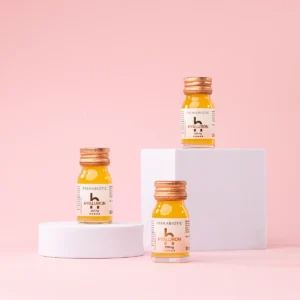
Is Hyaluronic Acid Safe?
Yes, hyaluronic acid is considered a safe substance because it naturally occurs in the human body. The lowest risk comes from cosmetics and oral supplements, while injectable treatments (e.g., hyaluronic acid injections) require a skilled professional and may involve side effects. Here’s what else you should know about hyaluronic acid!
Hyaluronic Acid – What Is It Used For?
Hyaluronic acid is a naturally occurring compound in the human body – in the skin, synovial fluid, and the vitreous body of the eye. Its levels decline with age, leading to dry skin, loss of elasticity, and the formation of wrinkles. This is why products containing this ingredient are so popular.
Common Uses:
- Aesthetic Medicine – Hyaluronic acid injections are used to fill wrinkles, enhance lips, and improve facial contours. This is one of the most commonly performed procedures.
- Skincare Cosmetics – Creams and serums with hyaluronic acid support skin hydration and regeneration.
- Ophthalmology – Eye drops containing hyaluronic acid relieve dryness and irritation.
- Supplementation – Oral hyaluronic acid supports skin from within and can also aid joint health.
Importantly, many people opt for facial hyaluronic acid treatments not only for aesthetic reasons but also as a preventative measure to slow down ageing processes.
Hyaluronic Acid – Side Effects and Possible Complications
Although it is a natural substance, the question of whether hyaluronic acid is safe in injectable form requires further discussion. Most procedures are complication-free, but side effects can occur.
Most Common:
- Local pain and tenderness at the injection site
- Swelling and redness
- Minor bruising at the puncture site
- Small lumps under the skin (if the product is not evenly distributed)
Less Common:
- Allergic reactions
- Infections
- Facial asymmetry
In severe cases – vascular complications (e.g., blockages leading to skin necrosis)
Hyaluronic Acid for the Face
Facial hyaluronic acid treatments are particularly popular. The most common procedures include lip augmentation, tear trough filling, jawline enhancement, and wrinkle reduction. Hyaluronic acid injections provide quick rejuvenation, but results are not permanent – the product gradually breaks down, and the treatment must be repeated.
If you are considering injections, remember: yes, hyaluronic acid for the face is effective, but only if performed by an experienced professional.
What Not to Combine with Hyaluronic Acid
A common question is: what should you avoid combining with hyaluronic acid to prevent skin problems or reduced treatment efficacy? While hyaluronic acid itself is gentle, combining it with certain ingredients or treatments can cause irritation.
Retinol
Although highly effective as an anti-ageing ingredient, combining it with hyaluronic acid injections can increase the risk of irritation, flaking, or dryness. It is recommended to pause retinol use for a few days before and after treatment to allow the skin to recover and better absorb the hyaluronic acid.
AHA and BHA Acids
These are exfoliating acids that work intensively on the epidermis. Using them simultaneously with hyaluronic acid injections or shortly after treatment may make the skin overly sensitive and red. To avoid this, it is best to pause acid-based skincare for a few days and let the skin heal.
Exfoliating and Laser Treatments
Microdermabrasion, chemical peels, or fractional laser treatments interfere with the skin barrier. Combined with recent injections, they may cause inflammation, lumps, or even migration of the product. It is therefore recommended to wait a few weeks after hyaluronic acid injections before undergoing intensive cosmetic procedures.
Alcohol and Smoking
They do not react directly with hyaluronic acid, but they significantly affect results. Alcohol dehydrates the body, potentially shortening the filler’s longevity, and smoking impairs microcirculation and skin regeneration. To maintain treatment results for as long as possible, it is best to limit or avoid these factors entirely.
Hyaluronic Acid to Drink – A Safe Alternative?
More and more people who want to avoid invasive procedures are turning to supplements. Hyaluronic acid supplements are well tolerated, and studies show that they improve skin hydration, support elasticity, and may promote joint health.
Compared with injectable treatments, oral supplementation carries no risk of mechanical complications, infections, or asymmetry. Therefore, answering the question “is hyaluronic acid safe?”, drinking hyaluronic acid is considered one of the safest and most effective options.
Is Hyaluronic Acid Safe in Pregnancy?
During pregnancy, it is always wise to be cautious with skincare and supplements. Although hyaluronic acid is a substance naturally present in the body and generally regarded as safe, available research on the use of injectable treatments or high-dose oral supplements during pregnancy is limited.
Topical products like creams and serums are generally considered low-risk during pregnancy. Injectable treatments and high-dose oral supplements have limited research and should be used with caution. Always consult your healthcare provider before using hyaluronic acid during pregnancy to ensure the safety of both mother and baby.
What Is the Safest Form of Hyaluronic Acid
Hyaluronic acid can be used in many ways – from creams and serums to supplements and injections performed in aesthetic medicine clinics. Each method has its advantages, but also different risks and levels of safety:
- Hyaluronic acid injections act quickly and effectively, but carry a risk of side effects and should only be performed by doctors.
- Hyaluronic acid in creams and serums is a safe method for daily skincare and preventative anti-ageing.
- Oral hyaluronic acid is a convenient and safe alternative for those who want to improve skin appearance from within, without the risks associated with injections.
In summary, whether hyaluronic acid is safe depends on how it is used. Injections provide fast results but involve risks not present with supplements or cosmetics. Therefore, for long-term and safe skin support, oral hyaluronic acid supplementation is the best solution.
Check out the other articles:
